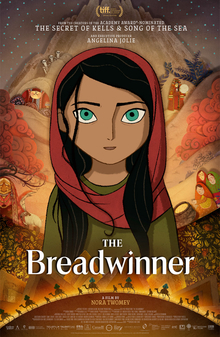
My wife added this to our list, probably because it’s been a while since we’ve watched an animated film. I was inclined to dislike it however as it was by Cartoon Saloon, the same studio which made The Secret of Kells and Song of the Sea. I didn’t like both of them as I felt that they were first and foremost children’s films with no real punch in them. I am pleased to report that the same cannot be said for The Breadwinner which is so hard hitting that it isn’t suitable viewing for children at all.
Parvana and her family live in Kabul, Afghanistan which has fallen under the control of the Taliban. With adult women forced to remain indoors, the young Parvana accompanies her crippled father at the market where they sell what possessions they have and offer reading and writing services. One day a zealous young Taliban takes offense at the pair when the father spurns his offer to marry Parvana and arrests him. With no adult male in the household, the family that includes her mother, elder sister and infant brother are unable to work or even buy food at the market. Finally Parvana cuts her hair and dresses up in male clothing in order to pass as a boy. With this single change, she gains the freedom to roam the city at will and is able to buy anything she wants and do work as needed. In this way she hopes to somehow free her father from prison and also discovers that she isn’t the first girl to come up with this subterfuge.
I read that the premise here is similar to an earlier and quite well known Afghan film, Osama. I haven’t watched that one but if I had, I think I would feel that The Breadwinner is derivative. As it is, I found the story to be both powerful and all too plausible. The casual threat of random Taliban zealots is so much more horrific than the fantastical dangers in Song of the Sea or the sanitized violence in The Secret of Kells. One particular scene in which Parvana’s mother, her body entirely covered in a burka as required by the Taliban, being brutally beaten with a walking stick simply for not immediately obeying a man’s instructions is so brutal that I wouldn’t recommend letting children see it. At the same time I like how it shows that there are plenty of people around who are sympathetic to the family but fear openly opposing the zealots.
A motif that runs throughout the film is that Parvana hails from a family of storytellers, perhaps as a reminder that the region’s rich history reaches back to pre-Islamic times. It helps to add a touch of the mystic to the story to make it feel more stylistically in line with the studio’s previous productions. I feel however that it’s an unnecessary distraction. They clearly mean the final reveal of the story within the story to be a big deal but you can largely guess the tragedy there already so it falls flat. The personal sacrifice of the Taliban soldier who helps Parvani for example feels more moving than whatever happens in the side-story. I just think it’s ironic that this animation studio appears to think of itself as drawing inspiration from mythology but I only like this one for its scenes which are set in the present.
Apart from this, The Breadwinner also suffers from some other flaws. Being based on a children’s novel by a Canadian activist, it feels more earnest than authentic and I feel that it’s a little too harsh on Islam by not drawing a clear line between the Talibans and more moderate Muslims. Still, I found this to be an excellent film and I’m sad that it made only a desultory amount of money, far below what the studio earned from its previous two projects.